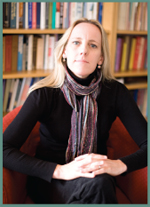It Makes You Proud to be a Humanist

When you consider the names on the list of recipients of the Humanist of the Year award, and the contributions that these individuals have made to humanity, it’s both humbling and inspiring, and makes you proud to be a humanist. And I often wonder whether we should designate it the Humanist of the Years award because the recipients are people whose storied careers and impact over time have precipitated the honor.
Now, while the American Humanist Association is seventy-five years old, Jared Diamond is our sixty-third Humanist of the Year. The AHA first presented this award in 1953 to Anton J. Carlson, who was the longtime chair of the Physiology Department at the University of Chicago. In his Humanist of the Year acceptance speech Carlson said,
The grass roots as well as the clouds are parts of man’s environment, past and present. Our education is not completed at the end of the sophomore year in college or even at the conclusion of the senior year. There must be continued adult education other than that provided by the modern soap opera, by propaganda, by amusement.
(All of us who’ve simply had it with the 2016 presidential election can agree—there’s got to be more.)
This year the AHA honored someone who’s had a significant hand in the continuing education of millions of adults, as well as students. In fact, Professor Diamond regretted having to leave the conference the morning after receiving his award but he was in the middle of finals at UCLA and had students to attend to. Diamond is the author of five best-selling books (translated into thirty-eight languages) about human societies and human evolution. His 1997 Pulitzer Prize-winning Guns, Germs, and Steel: The Fates of Human Societies is widely celebrated for its scope and explanatory power.
One area of human evolution Diamond elucidates so well deals with the different functions of religion in both ancient and modern societies. For example, as a way to explain the unknown, religion has waned in light of scientific discovery. But the more volatile the world is, the more religion functions as a comfort. We humanists have the most trouble with the more modern use of religion to control people and to justify violence. But we are immensely grateful to those like Diamond who present these challenging ideas with such integrity. In short, Jared Diamond rocks. (And I’m sure I’m not the first to employ that pun.)
The other esteemed individuals honored by the American Humanist Association at its 75th Annual Conference exemplify similar integrity and humanist values in a variety of fields. Isaac Asimov Science Awardee Elizabeth F. Loftus has done groundbreaking work in the study of memory, specifically as it relates to criminal justice. Bishop John Shelby Spong connects humanism to a liberal and loving theology with his signature candor and humor. Nebraska State Senator Ernie Chambers, who led the effort to abolish the death penalty in his state, may make you squirm or smile but he always gets at the truth. Antiwar and social justice advocate Medea Benjamin is similarly bold in her criticism of the US war machine and decidedly humanist in her intentions. And finally, artist John de Lancie, who many humanists know for his portrayal of Q on Star Trek, entertains with a vivid recollection of his path to humanism, and reminds us of why we must find magic in reality while refuting magical thinking—“Because the greatest story ever told cannot be truly great if it’s locked in time.” What a thrill to have each of these stellar humans involved with the humanist project.
The 2016 election is upon us, and at times it’s seemed it would never end. But we must see it through. In September, a survey by the Public Policy Research Institute found that in the last eight years the percentage of the American public who claim no religious affiliation has grown from 17 percent to 25 percent. And in all those years the percentage of unaffiliated Americans who vote—which includes humanists, atheists, and agnostics—remained at just 12 percent. I know our 2016 humanist awardees would join me in roundly urging all the nones: Go vote!
